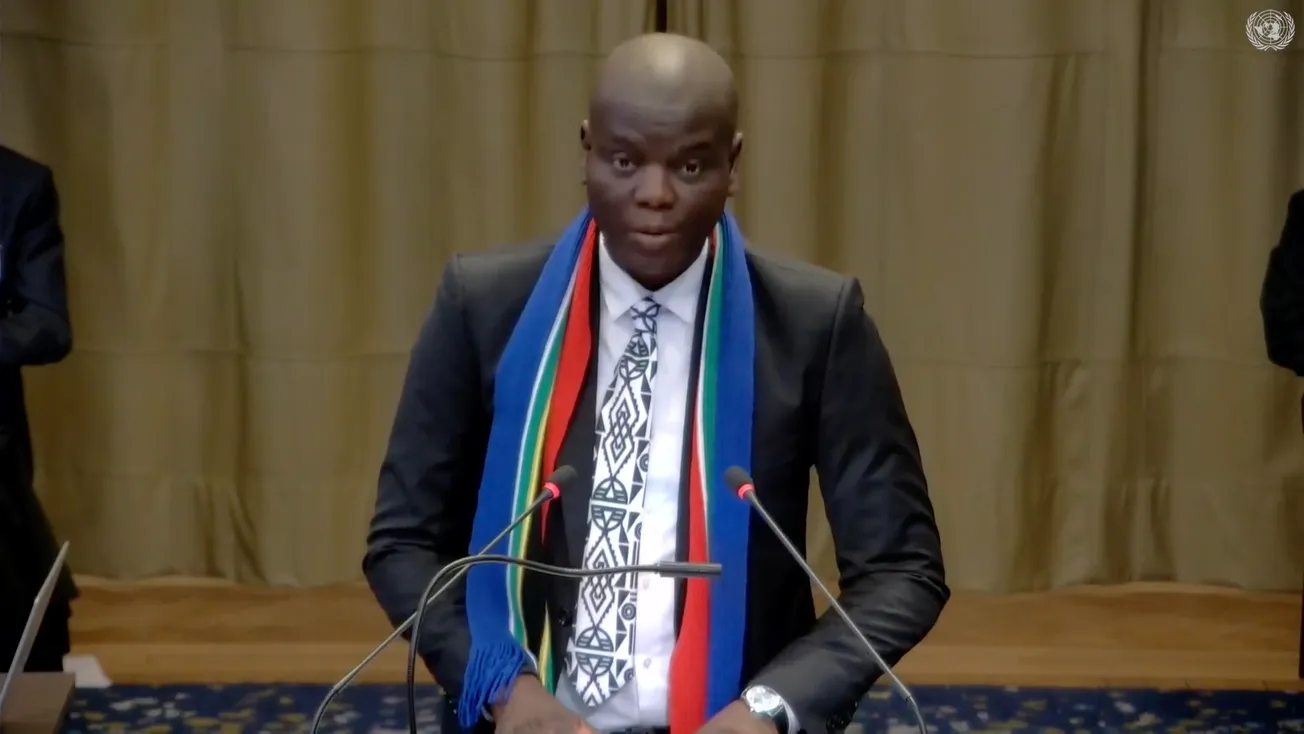South Africa’s Minister of Justice Ronald Lamola, who introduced their six legal experts, opened his brief presentation by quoting Nelson Mandela: “In extending our hands across the miles to the people of Palestine, we do so in the full knowledge that we are part of a humanity that is at one.” Lamola then said: “This is the spirit in which South Africa” chose in 1998 to sign on to the Genocide Convention. “This is the spirit in which we approach the Court.” He closed his presentation by invoking Martin Luther King, declaring that the “arc of the moral universe is long, but it bends toward justice.”
After the presentation of Israel’s genocidal acts by Adila Hassim, South Africa’s Tembeka Ngcukaitobi dealt with the naked statements of genocidal intent by Israeli officials, as he put it, from the Prime Minister and the President, to the Ministers of Defense, of National Security, and of Energy, to various Knesset members, and all the way to the soldiers on the front. Then he showed a short video of Israeli soldiers on Dec. 7 dancing in a circle and singing, in jubilation, two bizarre lyrics. According to the English translation provided, the first lyric was: “Destroy the seed of Amalek,” hence, illustrating the direct continuity with the previous evidence of Netanyahu’s address to Israel’s soldiers: “You must remember what Amalek has done to you, says our holy Bible. And we do remember.” Reference to “Amalek,” amongst the “blood and soil” heretics in Israel, is key and code for a passage 1 Samuel 15:3: “Now go and smite Amalek, and utterly destroy all that they have, and spare them not; but slay both man and woman, infant and suckling, ox and sheep, camel and ass.”
The punchline of the second lyric was: “We know our motto, there are no uninvolved civilians.” This displayed the policy connection with various Israeli officials who had invoked versions of “collective guilt.” One which Ngcukaitobi had cited in yesterday’s testimony was from Israel’s National Security Minister Itamar Ben-Gvir: “When we say that Hamas should be destroyed, it also means those who celebrate, those who support, and those who hand out candy—they’re all terrorists, and they should also be destroyed.”
Finally, Irish lawyer Ms. Blinne Ni Ghralaigh, whose task was to address the genocidal events set into motion, spoke as the fifth of the sixth legal experts. While she clearly made the point that it was expected there would now be more deaths from disease and starvation than from the previous shootings and bombings, of special note was the climax of her presentation. She displayed a photo of a whiteboard in a Gaza hospital, one used for scheduling surgeries. She explained: “South Africa is here before this Court, in the Peace Palace. It has done what it could. It is doing what it can, by initiating these proceedings…. South Africa now respectfully and humbly calls on this honorable Court to do what is in its power to do, to indicate the provisional measures that are so urgently required to prevent further irreparable harm to the Palestinian people in Gaza, whose hopes—including for their very survival—are now vested in this Court.”
“The whiteboard is wiped clean of no longer possible surgical cases, leaving only a hand-written message by a Médecins Sans Frontières doctor,” which reads: ‘Whoever stays until the end will tell the story. We did what we could. Remember us.’” She explained that the author, Dr. Mahmoud Abu Nujaila, died shortly afterwards, when Israel bombed the hospital on Nov. 21.
Then she quoted the Christmas message from Bethlehem of Palestinian Rev. Munther Isaac: “Gaza as we know it no longer exists. This is an annihilation. This is a genocide. We will rise. We will stand up again from the midst of destruction, as we have always done as Palestinians, although this is by far maybe the biggest blow we have received…. No apologies will be accepted after the genocide…. What has been done has been done. I want you to look at the mirror and ask, ‘where was I when Gaza was going through a genocide.’”


